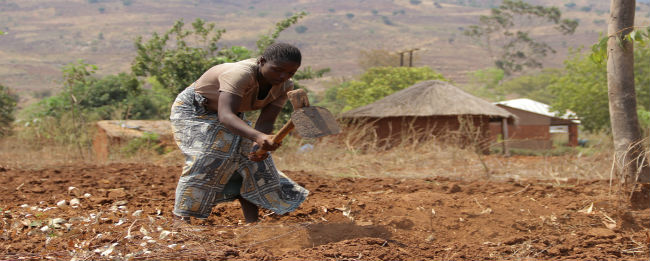At times in 2016 it has been hard to know where and who to be worried about in the world most.
In recent weeks, unfathomable images of the death and destruction in the Syrian city of Aleppo have filled our TV screens – it’s impossible not to be horrified by the scale of the suffering.
Indeed, alongside the substantial political change at home and abroad, 2016 may be remembered most for the image of five-year-old Omran Daqneesh sitting bleeding and dazed in an ambulance after being pulled from the rubble of Aleppo.
It was an all too human picture of the price of failing to find peace in Syria.
The intense suffering in Aleppo in recent weeks has been an appalling final chapter in a year in which humanitarian crises have invariably competed for attention.
Beyond Syria, we’ve responded to crises in Malawi, Iraq, West Africa, South Sudan and Haiti.
Yet we know we can’t wait for one emergency to end before helping those trapped in another.
Nor can we diminish our efforts to tackle extreme and growing inequality while helping those battling chronic poverty either around the world, or much closer to home.
Here in Scotland, the first half of 2016 was dominated by the Scottish Parliament election.
We called on every party to commit to creating a more equal Scotland within a more equal world and our “Even It Up” paper outlined some of the ways they could help achieve it.
We were encouraged that the parties committed to a number of our domestic and international priorities and we will continue to campaign to ensure this results in meaningful policy changes.
For example, we must ensure the Scottish Government’s welcome commitment to the creation of a Poverty and Inequality Commission embeds the level of ambition we know is needed.
By the summer, the worsening drought across Southern Africa saw us launch an emergency appeal for Malawi – one of Scotland’s closest development partners – where 6.5 million people faced hunger: more than Scotland’s entire population.
I saw for myself the devastating impact on people who did barely anything to cause the climate change, including 24-year-old Jenipher Nkotima and her three orphaned nephews.
She explained to me how their crop had failed leaving them with no food. Her desperation was painful. You can watch a short film, featuring Jenipher, here.
The good news is that money donated by people across Scotland is making a huge difference: since last April, we have helped more than a quarter of a million people across six districts of Malawi – including Jenipher. As I discovered, just a small amount of help can protect people from hunger.
We are hugely grateful for all of the money raised in Scotland and for the support of the Scottish Government, but more help is still needed – so please give what you can here.
Meanwhile, our fantastic campaigners were attending music festivals and community events throughout Scotland to garner support for our “Stand as One” refugee campaign.
We were hugely encouraged at the response, with hundreds of Scots joining us to show solidarity with the millions of people forced to flee conflict, disaster and poverty in the world.
The need for this solidarity was sadly underlined by the murder of Jo Cox MP.
Jo worked for Oxfam for eight years and we joined with hundreds of people in Scotland others to celebrate her life and to say firmly together that we have ‘more in common‘.
Soon afterwards, we launched a new campaign – this time focused on tax dodging.
More than 2,100 people in Scotland wrote to the leaders of the five Holyrood parties amid claims a legal mechanism, known as “Scottish Limited Partnerships“, are being abused by tax dodgers.
Encouragingly all five leaders have voiced support, placing pressure on the UK Government to act in early 2017 to close any loopholes which exist.
By September, we published research outlining what ‘decent work’ means to Scotland’s low-paid workers. Crucially, this wasn’t research on low-paid workers but with them – including a social care worker battling to make ends meet, and an agency worker struggling to secure enough hours.
It is clear there is much to do to ensure work is always a route out of poverty.
One consequence of in-work poverty is acute food insecurity with the network of food banks across Scotland both another sign of Scotland’s incredible solidarity, and of our collective failure.
This year we developed with partners a new three-year project, recently funded by the Big Lottery Fund Scotland, to help evolve the response in Scotland towards tackling the causes of food poverty.
It will be a huge challenge but, by working together, we hope to help minimise the need for food aid.
From hunger at home, to starvation amid the conflict in Yemen: as 2016 ended, we helped launch the Disasters Emergency Committee’s Yemen Crisis Appeal.
As ever, Scotland responded incredibly – donating nearly £1.4 million and counting.
Oxfam will, of course, also continue to campaign for the UK Government to halt arms sales and military support to Saudi Arabia and instead do more to push for peace.
From the string of crises around the world to our efforts to reduce inequality and poverty globally and in Scotland, the support of people in Scotland underpins everything we do.
On behalf of Oxfam Scotland and all the people we help – thank you so much.
